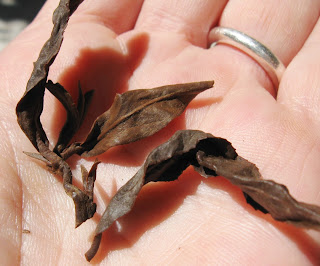Happened this morning while reading the Saturday newspaper and the cup of Feng Huang Hong Cha snapped me out of whatever I was reading.
 |
| Luku on right is lighter, more golden. |
It's one of the three new 2012 black teas in my latest order from Camellia Sinensis which arrived a couple of days ago, and I decided to open this morning.
Medium bodied, smooth in the mouth, just enough snap to make it quenching and a wonderful hint of sweetness in the fruit-sauce (stonefruit?) end of things, a hint of a caramel note and an aftertaste hint of cinnamon too. Very little bitterness. Mmmm, yes!
 |
| Feng Huang on left, Luku on right |
I tasted it next to a black tea from Taiwan called Luku Hong Cha. The two dry leaves couldn't be more different -- one thin and spidery and the other bent and folded sort of like a Ti Kwan Yin oolong (along with quite a few leaf stems).
I infused both at 95C at three minutes and then gave the Luku another 30 seconds because the leaves are rolled so tightly.
I'm afraid the Luku paled next to the Feng Huang -- perhaps not a fair pairing given how captured I am by the latter today. The Luku is lighter bodied, abit of a tang in the flavour, along with faint wood smoke or hot metal, light furring on the mouth and a pasta flavour. Overall rather flat, but perhaps that is just in comparison to you-know-who. I will give the Luku another try another day.
In the meantime, I'm heading right back to the CS site to order more of the Feng Huang before they run out. It was the priciest of the three I ordered ($25 for 50 grams) but I'm happy to say the quality shines through. There's so much bad tea served in these parts, that I will support some delicious, fresh tea at this price to encourage more of it being available.
Feng Huang, by the way, means Phoenix, as in the mythical bird. Or at least it means a mythical bird which we in the west have denoted as similar to our Phoenix. Hong Cha means Red Tea which we in the west call Black Tea. Per Camellia Sinensis, the tea is made in Guangdong province, which is on the south east coast of China.
Phoenix Oolong, is where I've heard the name before, as in the high-end Fenghuang Dan Cong oolong, reputedly made from tea trees which are several hundred years old in northern Guangdong province and southern Fujian province. According to the Heiss' "The Story of Tea," "The teas are grown on and in the vicinity of Fenghuang, Phoenix Mountain, located in Chiuan and Chozhou counties. This is a subtropical regions, and the tea grows at altitudes of 4,265 feet in terraced gardens composed of rocky, loose soil."
Hmmm, this makes me want to know what varietal of tea this black tea is and if it's a type usually used for oolong....?
Here's a couple snaps of the two teas' wet leaves. Two things strike me immediately -- the leaves are on the large side, and both boast a beautifully even oxidation. Their colour is an even green-tinged red-brown. Like a used copper penny.
I opted for larger density photos here so you admire the leaves -- click to enlarge them.
 |
| Wet leaves of Feng Huang Hong Cha 2012 from Guangdong |
 |
| Wet leaves of Luku Hong Cha 2012 from Taiwan showing bud and leaf pluck and some beautiful downy pekoe on the middle leaf. |

No comments:
Post a Comment